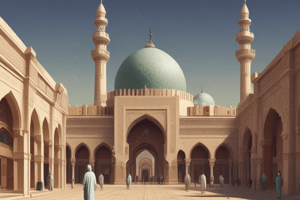Podcast
Questions and Answers
What significant event in the 7th century marked the rise of Islam in Saudi Arabia?
What significant event in the 7th century marked the rise of Islam in Saudi Arabia?
- The foundation of the first Saudi state
- The teachings of Muhammad in Mecca and Medina (correct)
- The establishment of trading routes in the region
- The unification of various tribes under a single ruler
Which two historical figures were instrumental in founding the first Saudi state?
Which two historical figures were instrumental in founding the first Saudi state?
- Ibn Saud and Al-Ghazali
- Abdulaziz Al Saud and the Ottoman Emperor
- Prophet Muhammad and Abu Bakr
- Muhammad ibn Saud and Muhammad ibn Abd al-Wahhab (correct)
What year saw the establishment of the Kingdom of Saudi Arabia?
What year saw the establishment of the Kingdom of Saudi Arabia?
- 700
- 1744
- 1932 (correct)
- 1938
What was a major factor that transformed Saudi Arabia into one of the wealthiest nations in the world?
What was a major factor that transformed Saudi Arabia into one of the wealthiest nations in the world?
Which Islamic empires controlled the Arabian Peninsula before the modern state was established?
Which Islamic empires controlled the Arabian Peninsula before the modern state was established?
How does Saudi Arabia's governance structure primarily operate?
How does Saudi Arabia's governance structure primarily operate?
What role does Saudi Arabia play in the Islamic world?
What role does Saudi Arabia play in the Islamic world?
Flashcards are hidden until you start studying
Study Notes
Historical Foundations
- Located on the Arabian Peninsula, Saudi Arabia's history is linked to ancient civilizations and vital trade routes.
- The rise of Islam in the 7th century marked a significant turning point, initiated by Prophet Muhammad in Mecca and Medina.
- The region experienced dominance from various Islamic empires, such as the Umayyads, Abbasids, and the Ottoman Empire, all influencing its development.
Formation of Modern Saudi Arabia
- The 18th century saw the alliance between Muhammad ibn Saud and Islamic reformer Muhammad ibn Abd al-Wahhab, establishing the first Saudi state in 1744.
- The founding philosophy was based on the Wahhabi doctrine, promoting a strict interpretation of Islam.
- Although this initial state was ephemeral, the Saudi dynasty resurfaced twice, ultimately leading to the establishment of the Kingdom of Saudi Arabia in 1932 by Abdulaziz Al Saud, known as Ibn Saud.
Economic Transformation and Global Impact
- The discovery of oil in 1938 revolutionized the Saudi economy, catapulting the nation to one of the world's wealthiest countries.
- As a result of its oil wealth, Saudi Arabia gained considerable geopolitical influence and became a key player in global energy markets.
- The kingdom holds a prominent leadership role within the Islamic world, primarily due to its stewardship of the holy cities of Mecca and Medina.
Governance and Religious Structure
- Saudi Arabia's government operates as a strict monarchy guided by Islamic law, influencing both its domestic policies and international relations.
Studying That Suits You
Use AI to generate personalized quizzes and flashcards to suit your learning preferences.




